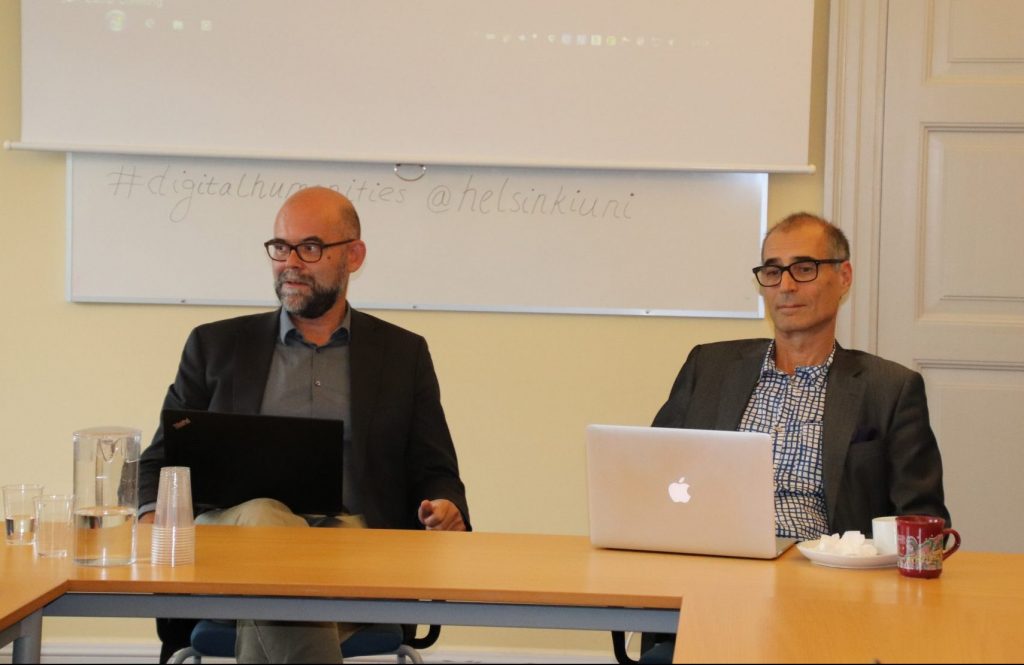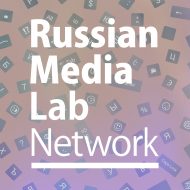by Janne Suutarinen
“The question of algorithms concerns much of human action and control of one’s own life. Thus it is in the core of the whole idea of humanity.” – Markku Kangaspuro
This week Aleksanteri Institute hosted a workshop (Politics of) Digital Humanities in Eastern European Studies, which brought together an interdisciplinary group of scholars to present their research and to discuss about the future of the ever-digitalizing world of humanities. The presentations dealt with for example challenges and possibilities of digital archives, computational linguistics, memory politics in a digital age, as well as Twitter activity of Kremlin trolls.

Markku Kangaspuro, Aleksanteri Institute’s director and the host of the event, believes that the progress in the field of digital humanities opens up new possibilities in the research or Russian media as well. For instance Integrum, the vast archive of Russian, Ukrainian and other former Soviet countries’ media sources, has proven to be essential.
What are the potentials of digital humanities in the research of Russian media?
“The potential is great. Besides Integrum, where we have almost the whole Russian media starting from about mid-90’s digitalized in one data base, the media in general is moving to the internet as we speak. This opens up a huge bulk of sources, and in the case we can get these sources for the use of research, we really need new research methods and tools also.
The current situation is not even comparable to the old style media studies, in which one used papery newspapers, listened to radio and maybe read microfilms.”
What would be the three big steps for digital humanities in the near future?
“One is the big issues will be the question of algorithms; how to better understand their logic and to learn how it is possible to use them in our research. It is still a somewhat wild world which we don’t know very well, but at the same time it influences practically all that we are doing at the moment related to the internet and digital world. The question of algorithms concerns much of human action and control of one’s own life. Thus it is in the core of the whole idea of humanity.
The second important task is to develop the methodologies in digital humanities and to further the understanding of how we can make use of these huge bulks of material. We also have to make sure we understand the principles and mechanisms of how they are collected.
At the moment there is a big risk of conducting research in a biased way and with biased materials and sources. In some disciplines, if you want to do relevant research in the professional and academic manner, you can’t rely on digital sources entirely, even though they are starting to become largely available. There might be a temptation to use exclusively digital sources, especially for the younger generations who are used to working with internet and digital sources. This might lead to the situation where master’s thesis or even doctoral thesis might be based only on easily accessible digital materials. Thus the majority of the sources are in the danger of being left behind.
We need to make sure we understand how the digital sources are formed and who has produced them. If we are not aware and ready to concentrate on these issues, soon we are in trouble with biased search results as well. Digital sources entail new challenges of source criticism as well.
Thirdly, the progress in digital humanities creates an urgent need to develop new research methodologies. It opens new windows of opportunities, which is an important mission for researchers to get a grasp of. It will probably mean that we also need to co-operate more closely with experts on the side of computer science and similar issues. In the perspective of humanities and social sciences, this is a great leap.”
“I think the main secret is to encourage younger scholars to also be experimental and maybe even creating a culture of failure. This would mean a strategy of trial and error that would produce new approaches and new results.” – Peter Haslinger
Peter Haslinger is the director of the Herder Institute for historical research on East Central Europe in Marburg, Germany. The institute is member of the Leibniz Association. Haslinger is historian, and his areas of work span from the history of East Central Europe since 1848, research on nationalism and regionalism and politics of history, to name a few.
Haslinger says that digital humanities is still something that needs a lot of reflection, and not only between specific disciplines but also between different hubs and centers for the humanities. The historian still thinks that the transnational exchange is underrated and undervalued, so the workshop series should be continued.
What would be the three big steps for digital humanities in the near future?
“One thing in terms of the theoretical and methodological basis is to foster trans-disciplinary dialogue. In the digital humanities, for example the corpus linguistics tend to much more advanced than the methods historians work with. In here I see a need in levelling and balancing.
The second step would be to induce more active, self-reflective and critical research designs. The critical reflectivity should materialize in all spheres, be it building up infrastructures, teaching or transfer activities.
The third major need of development considers sustainability. We don’t yet have a structure that would guarantee that all the very important digital humanities projects and their results, the data, will still be out there and available in ten years. We need some kind of a European joint effort to secure the sustainability of the research.”
How well is the potential of digital humanities used right now?
“Though the situation is getting better and better, there still is room for more improvement. The more we train people in universities and also in external institutions to incorporate methods of digital humanities into their individual research, the more inspiration we can draw from different directions.
I would say the progress is speeding up, at least in Germany. There is a tendency towards more openness, but it still will be a long way to go before digital humanities, or digital history in my case, becomes so normal that we do not have to use the term anymore.
My aim would be to incorporate the methods and processes of digital humanities into common research designs as well as teaching activities, with hands-on components included.”
What are the main motivations for students to explore the digital humanities?
“What I’m sensing is that the younger students are much more open than the people coming from my generation, who haven’t been brought up digitally, so to speak. The younger generations rest upon their daily digital experiences, but sometimes have problems to relate that to their acadamic interests and plans. So we still have a bridge to gap here in terms of methods that are applicable to individual projects.
At the Herder Institute we have a research academy, in which post-docs have heavily relied on digital humanities methods for their individual projects. We also organise workshops like this here in order to provide ideas on how to combine these methods. I think the main secret is to encourage younger scholars to also be experimental and maybe even creating a culture of failure. This would mean a strategy of trial and error that would produce new approaches and new results.”
More thoughts of the workshop attendees on Aleksanteri Institute’s website.

